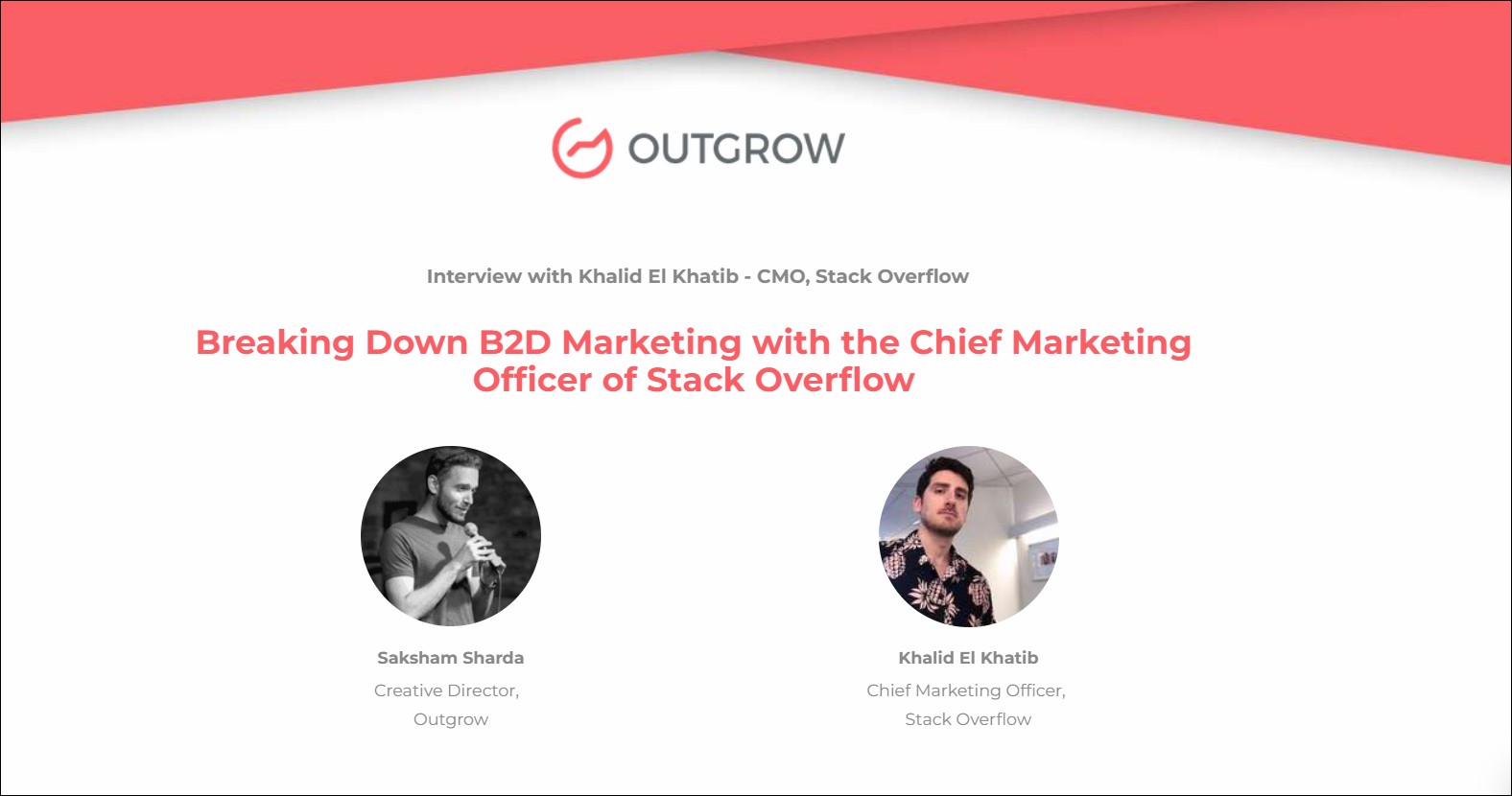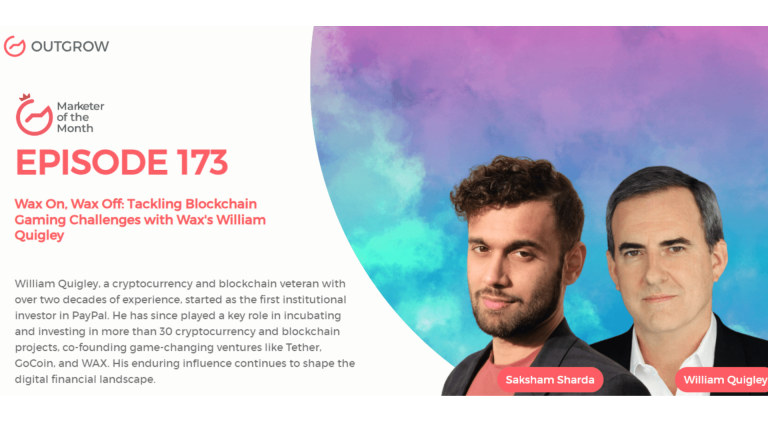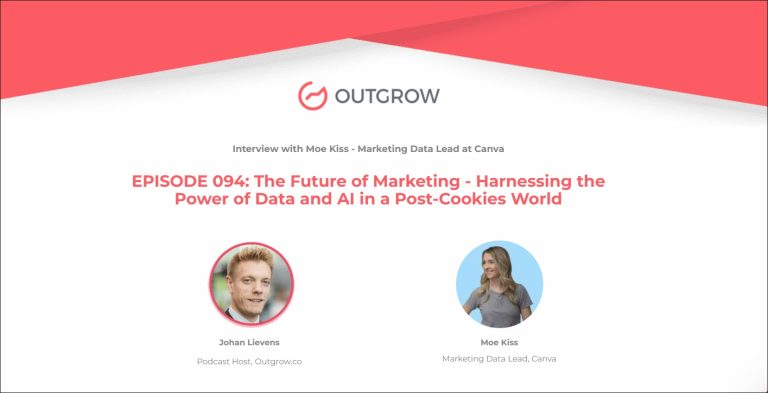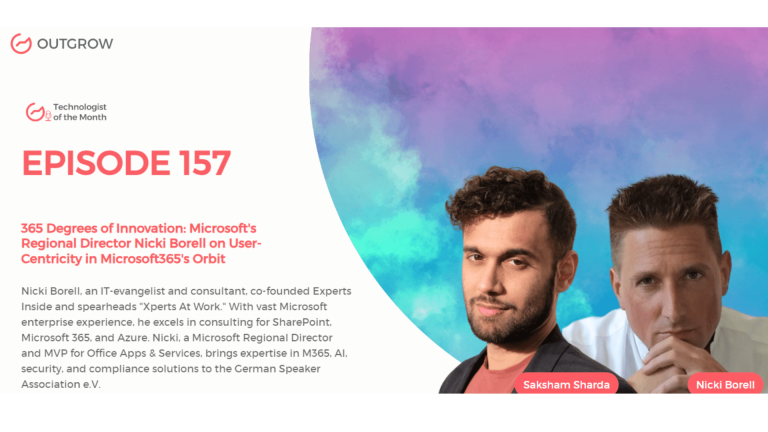Summarize with :
Marketer of the Month Podcast with Khalid El Khatib
Table of Contents
Hey there! Welcome to the Marketer Of The Month blog!
We recently interviewed Khalid El Khatib for our monthly podcast – ‘Marketer of the Month’! We had some amazing insightful conversations with Khalid and here’s what we discussed about –
1. Managing Stack Overflow’s highly distributed teams effectively
2. Why you should hire people who are smarter than you
3. How Stack Overflow rose to be among the top 200 websites worldwide
4. What you need to know about marketing directly to developers
5. Scaling marketing teams across a variety of industries
6. Why building a brand is essential in today’s market
About our host:
Dr. Saksham Sharda is the Chief Information Officer at Outgrow.co. He specializes in data collection, analysis, filtering, and transfer by the means of widgets and applets. Interactive, cultural, and trending widgets designed by him have been featured on TrendHunter, Alibaba, ProductHunt, New York Marketing Association, FactoryBerlin, Digimarcon Silicon Valley, and at The European Affiliate Summit.
About our guest:
Khalid El Khatib is the Chief Marketing Officer at Stack Overflow and is responsible for marketing, communications, and advertising initiatives. Throughout his career, he’s elevated and transformed the awareness and perception of global brands, most recently at GLG where he was Vice President of Marketing and Communications. He began his career working in communications at Teach For America which fostered a passion for social impact and continues to do a lot of volunteer work.
Breaking Down B2D Marketing With the Chief Marketing Officer of Stack Overflow
The Intro!
Saksham Sharda: Hi, everyone. Welcome to another episode of Outgrow’s Marketer of the Month. I’m your host, Dr. Saksham Sharda. I’m the creative director at Outgrow.co. And for this month we’re going to interview Khalid El Khatib, who is the CMO at Stack Overflow. Thanks for joining us, Khalid.
Khalid El Khatib: Thanks for inviting me, Saksham.
Saksham Sharda: In one sentence, what does your company do now?
Khalid El Khatib: Stack Overflow is the world’s largest developer community with a suite of products that serve developers and technologists as well.
Don’t have time to read? No problem, just watch the Podcast!
Or you can just listen to it on Spotify!
The Rapid Fire Round!
Saksham Sharda: So we’re gonna start with the rapid-fire round. The first question is at what age do you want to retire?
Khalid El Khatib: 60
Saksham Sharda: Work from home or work from the office?
Khalid El Khatib: Both.
Saksham Sharda: How long does it take you to get ready in the mornings?
Khalid El Khatib: 15 minutes.
Saksham Sharda: In one sentence describe to me a problem that your company is facing.
Khalid El Khatib: Hiring people
Saksham Sharda: Your favorite SaaS or software tool?
Khalid El Khatib: Love “Slack”
Saksham Sharda: The most embarrassing moment of your life?
Khalid El Khatib: I feel like I’ve fallen in public many times.
Saksham Sharda: Okay, who’s Peter Thiel?
Khalid El Khatib: Peter Thiel is a technology investor and billionaire.
Saksham Sharda: The first movie that comes to your mind when I say the word ambition?
Khalid El Khatib: Avatar
Saksham Sharda: Your favorite app?
Khalid El Khatib: Spelling Bee within the New York Times.
Saksham Sharda: The best no-code tool you use?
Khalid El Khatib: I don’t know.
Saksham Sharda: How many hours of sleep can you survive on?
Khalid El Khatib: Three
Saksham Sharda: Fill in the blank: An upcoming marketing trend is _________.
Khalid El Khatib: *Guessing*
Saksham Sharda: So we’re gonna pass that.
Saksham Sharda: The city in which the best kiss of your life happens?
Khalid El Khatib: New York
Saksham Sharda: Pick one – Mark Zuckerberg or Jack Dorsey?
Khalid El Khatib: Jack Dorsey.
Saksham Sharda: When did you last cry and why?
Khalid El Khatib: I last cried at my sister’s wedding.
Saksham Sharda: The biggest mistake of your career?
Khalid El Khatib: I only think about going forward.
Saksham Sharda: How do you relax?
Saksham Sharda: Reading
Saksham Sharda: How many speakers at this conference can you name and make them?
Khalid El Khatib: One by seeing.
Saksham Sharda: What’s his name?
Khalid El Khatib: Prashanth Chandrasekar.
Saksham Sharda: Okay. How many cups of coffee do you drink per day?
Khalid El Khatib: One to two
Saksham Sharda: A habit of yours that you hate?
Khalid El Khatib: I’m an introvert too much.
Saksham Sharda: The most valuable skill you have learned in life?
Khalid El Khatib: Writing.
Saksham Sharda: And the last question is your favorite Netflix show?
Khalid El Khatib: I just watched Heartstopper. So it was great.
Saksham Sharda: Okay. All right.
The Big Questions!
Saksham Sharda: So the bigger questions. On your LinkedIn you explain that you’re a full stack marketer, could you talk a bit more about that?
Khalid El Khatib: Sure. So at Stack Overflow, I manage five marketing teams – the brand team, the communications team, the demand generation team, the product marketing team, and the content team. And so one day I can be working with the brand team solving big challenges around how we frame or position the company, the next day, our ABM strategy for demand generation, and then a day after that focused on pricing and packaging strategy with product marketing. So I’d like to think I’m pretty agile, sometimes an inch deep and a mile wide, but defer to the expertise of my very smart colleagues, and can have a conversation about any marketing topic.
Saksham Sharda: So what’s your one advice to someone who’s managing an equally big marketing team? How do you manage your time? How do you allocate time to spend between different departments?
Khalid El Khatib: Well, I think my first piece of advice is always to hire people who are smarter than you. Don’t be afraid to hire people who are smarter than you for sure. Because you have to defer to the expertise of others, it’s not possible to be an excellent brand marketing CMO and an excellent demand generation CMO, so that’s one. Two, about managing time. You know, people ask me all the time, I wake up early, so I manage a highly distributed team. Many folks are on the West Coast or in the middle of the country. And so I get a lot of my work done between 7 am and 10 am, to spend a lot of my day in meetings. That said, I save most of my day on Friday for work time. So I block off time to do work. People know that I don’t do meetings on Fridays, and you have to be highly protective of that time if you want to get things done.
Saksham Sharda: Could you explain the term ‘stack’ itself as well as sub stack and finally Stack Overflow, for anyone confused about what all of these things mean?
Khalid El Khatib: Sure, Stack Overflow itself is a technical term an error that developers experienced, and that was the name of the community after a naming contest that was run in 2008 or 2009 when the site was launched. And it has nothing to do with a company substack, it has nothing to do with the company slack, which we are often confused with. It just happens to be a piggy, successful name.
Saksham Sharda: It must be challenging making such a business model work for an online utility-based largely upon the free sharing of advice and knowledge. Yet two years ago, your company raised 85 million in investment. How do you explain this magic?
Khalid El Khatib: I think it’s not that challenging. We are very fortunate to have a massive community of 100 million people that visit our website every single month, making it one of the 200 most popular websites in the world. And so we often talk about this concept of community as a competitive moat. And so what we’ve been able to do is in partnership with our community launch products that they love, have a built-in customer base, and built-in evangelists. And whether it’s advertising, which we serve to our technical population, and continues to grow despite everything, or Stack Overflow for teams, effectively a private version of the public platform, our products feel very natural. And there are built-in demands given the massive reach that our public site has and has had since 2008.
Saksham Sharda: So what are some lessons you’ve learned from marketing to developers, and why traditional marketing tactics and tactics don’t work in this field?
Khalid El Khatib: Yeah, when I worked at WPP for a number of years, often working with B2C companies. And when I started working at Stack Overflow, I had managed developers before, but not marketing developers. And I effectively had to unlearn everything that I thought I knew about marketing. And so a very basic example, is when we promote Stack Overflow for teams, our private knowledge management and SaaS collaboration tool, which developers are the primary buyer, we tested a whole bunch of banner ads, and what converted best was the thing that would be the least sexy to a marketer. Very few colors, certainly no motion graphics, no stock images, no cartoons, not even a proprietary fine. So the more stripped down, the more straightforward, the higher it’s likely to convert. And so when you speak to a developer, whether it’s through a banner ad, through a video testimonial, or a white paper, you have to be as on the nose as possible, you have to speak clearly. And you really can’t mislead them or be superlative, or speak aspirationally. Here’s who we are, here’s what we’re trying to do, and here’s how we’ll help you in very real terms.
Saksham Sharda: And what is your experience been and scaling marketing teams across a variety of industries?
Khalid El Khatib: Yes, so at Stack Overflow, when I started at the company, there are about six people on the team. Today, that team is approaching 40-45 people, might be 50 by the end of the year. So I think that the challenge in marketing is that you always want to hire ahead of growth. But you want to do so responsibly. We’ve all seen countless examples of companies that have pivoted to video, for example, built huge House Media operations, only to have to let them go six months later. And so what we tried to do is very clearly define the business case, the KPIs, and the goals for which we’re bringing a team or an initiative on board so that we’re not in a position where we have to rein it in down the line. The other thing that I think we’ve aspired to do a good job around is ensuring that there’s a lot of cross-functional partnership. So customer stories are a great example of that. Our communications lead, our content lead, and product marketing lead, all work very closely to ensure that we are using all of our resources and that there is a lot of cross-functional collaboration. And if someone leaves, which is happening in a market like this, where there was high demand for talent and a lot of transition, that no one person is irreplaceable, that everyone knows a little bit of what’s going on what everyone else is doing. And we can continue to move forward because we are so cross-functional.
Saksham Sharda: And how would you relate this to building a brand? And how do you find if building a brand essential in today’s market?
Khalid El Khatib: I think building a brand is essential. And I think that oftentimes what we see is when a company is obsessed with performance marketing, dollar in dollar out, they struggle in a couple of ways. So one, if they ever had a crisis if the business misses some of their goals, if they have to do layoffs, there’s a breach. A lack of investment in the brand hurts them in environments like that. Because all they have is their customers which they could be losing. They might not have a sophisticated PR or communications operation. And there are very few evangelists for them. So I think that’s one challenge. The other is that if you’re not investing in a brand, there’s always a ceiling. So if you’re investing all of your money in performance marketing along the lines of SEO, SEM, or even ABM, or fields, you’re not going to be able to stay to think expansively, or aspirationally, about where the brands could go. And that’s true for companies who stick to one market, who don’t continually expand their personas over time. And so I’ve been fortunate to work at a company where not only our CFO, but our CEO understands that at least 10-15 of our budget has to be invested in brand awareness, broadly speaking.
Saksham Sharda: And how does one even measure the ROI of brand awareness? Like, what would be your thoughts about that?
Khalid El Khatib: Yeah, I talked about this all the time with other CMOs, and like we do what we can, but we’re never going to be able to get it to 100%. We’re never going to be able to say with 100% conviction that this $100,000 campaign we ran did X, Y, and Z. And so like everyone else, of course, we launched brand tracking surveys. So we can say, longitudinally, here’s how we moved the needle with a specific population of folks within our target market, on X, Y, and Z. We, of course, track things like social media follows, media impressions, and other metrics. But at the end of the day, you can feel what’s working and what’s not. And so what I tried to do, in addition to this sort of quantitative data points, is marry them with anecdotal feedback we’re hearing from sales. And so one example is we launched this April Fool’s Day prank, where we created a sort of fake hardware, a copy-and-paste keyboard for Stack Overflow. And given the enthusiasm that we felt from that we heard from people, it got like five the unboxing video got 500,000 views and sort of took over Twitter within the developer community that day, we made it real. And we sold out 10,000 units of that hardware within a day. And the salespeople were coming to, you know, beyond the enthusiasm we heard from our community, and folks who were not necessarily paying for our products. We heard from our salespeople, look my customers, and my prospects are dying to get their hands on this. And so what we did is we set aside a certain number of units. And we use those as a catalyst for conversations with sales folks driving our pipeline, accelerating our pipeline, driving our revenue forward. And that’s just a small example of where the brand stand was relatively minimal. But it did take up a lot of the team’s time. And had we not done that, you know, which some people scoffed at the time, we not only would have been leaving a lot of awareness on the table, but we would have been leaving real dollars on the table as well.
Saksham Sharda: And so to pivot the line of questioning a little, you’ve written often about LGBTQ issues and since it’s also pride month right now, we wanted to ask what role you think Tech has to play in the present and the future of the queer community?
Khalid El Khatib: Yeah, I think that the reason I took this job, so I was speaking at our tech conference, in the US about LGBTQ issues in the broader community, queer community, and tech. And the reason I took this job is because I understand that 85 of the developer population is visiting Stack Overflow every month, and over half of the developers are visiting Stack Overflow every single day. And so I believe that every single technology in the world, whether it’s the phones in our pockets, or the car that took me to this conference today, is being influenced by Stack Overflow, developers, and technologists who are building that technology or visiting our website. And if I and my role as a chief marketing officer in partnership with the leadership team can make our site one, two, and three percent more welcoming and inclusive, we can have a cascading effect on all technology. And so there are countless examples like the car rideshare, one that I just mentioned, where if we prioritize accessibility on our public platform, and we get developers and technologists thinking about accessibility or have a top of mind, they will hopefully incorporate some of that in their app as well. And so within the queer community, you know, I think that it’s a conversation we need to continue to have. But the more stories we can tell on our platform, whether it’s through a blog or behavior on the site, the more we’re doing good work. And it’s important that every single tech company doesn’t just change their logo for Pride Month, but that they sort of one understand the roles their products can play in making our worlds more inclusive, and two that their hiring practices, and their employee benefits and policies are written for everyone.
Saksham Sharda: Are you staying on for Amsterdam pride at the end of this month?
Khalid El Khatib: I’m not unfortunately, I’m headed back to New York where it’s pride in New York next week.
Saksham Sharda: So the last question is, what would you be doing if not this?
Khalid El Khatib: It’s a good question. Look, in between this job in my last job, I took about six weeks off. And as you mentioned earlier on the podcast, I do continue to freelance for a number of magazines in my free time as I said, what would it be like to have this sort of bohemian life as a writer, to write in the park, in Central Park during the day and wake up and go for a walk with my coffee and I don’t like it, wasn’t for me. I prefer the sort of fast-paced, high-intensity sort of Monday through Friday sprint, and then that sort of bohemian life reading, writing, relaxing, is better for me on the weekends, and so maybe years down the line, I will retire and write a little more full time. But for now, I enjoy working with a big, highly collaborative team and I love working for a company where we’re reaching millions of people.
Let’s Conclude!
Saksham Sharda: Thanks everyone for joining us for this month’s episode of Outgrow’s Marketer of the Month. That was Khalid El Khatib, who is the CMO at Stack Overflow. Thanks for joining us, Khalid.
Khalid El Khatib: Thanks for having me.
Saksham Sharda: Check out their website for more details and we’ll see you once again next month with another marketer of the month.








